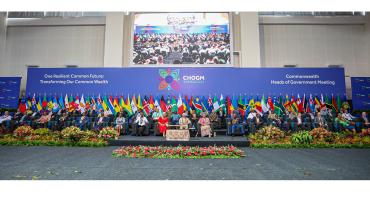Forced labour, child labour and exploitation were all addressed at an event marking International Human Rights Day.

Forced labour, child labour and exploitation were all addressed at an event marking International Human Rights Day.
A range of speakers took part including High Commissioners, businesses, government departments and civil society representatives.
The event focused on Sustainable Development Goal 8.7, which calls on states to ‘Take immediate and effective measures to eradicate forced labour, end modern slavery and human trafficking and secure the prohibition and elimination of the worst forms of child labour, including recruitment and use of child soldiers, and by 2025 end child labour in all its forms’.
More than 40 million people are the victims of modern slavery, with 25 million in forced labour and 15 million in forced marriage. Around 50 per cent of this number reside in Commonwealth countries.
After an opening address by the Australia High Commissioner to the United Kingdom, Alexander Downer, and the Belize High Commissioner to the United Kingdom, Perla Perdomo, panellists discussed progress to date in tackling child, early and forced marriage. In addition, they covered the eradication of child labour, supply chains in the fashion industry, and innovations in addressing target 8.7.
Chief of the International Labour Organization’s Fundamental Principles and Rights Branch, Beate Andrees, said, “We have top level political commitment and many leaders of the Commonwealth have shown this leadership internationally as well as at home. It’s very important to build momentum in sharing good practices in fostering collaborations across borders. This is very important because it’s a problem which doesn’t stop at a border; it literally affects every country. So we look at the Commonwealth as a partner to promote ratification of international standards, most importantly the recently adopted International Labour Organization’s Protocol on Forced Labour, but also to foster implementation’’.
The CEO of the Thomson Reuters Foundation, Monique Villa, talked about the challenge of modern slavery, which amounts to a $150bn business globally. However, each year just $1bn is committed collectively by governments to tackle the problem.
The event brought to a close the 16 Days of Action which took place between the International Day for the Elimination of Violence Against Women on 25 November and International Human Rights Day on 10 December.
Speaking after the event Belize High Commissioner Perla Perdomo said, “Belize is one of only five Commonwealth countries that has ratified all nine of the core human rights treaties. And so for Belize it is very important that we recognise International Human Rights Day and reflect on what we have achieved so far but also to look at ways we can improve going forward.”
Rebecca Terzeon from the UK Department for International Development talked about the scale of child marriage, both globally as well as across the Commonwealth. She said, “Child, early and forced marriage is a serious human rights concern and there are 15 million girls across the world who are married as children, and approximately half of those live in Commonwealth countries.
“The Commonwealth as a group has a really important opportunity to work together towards eliminating child marriage, both within and beyond the Commonwealth.”
Head of Human Rights at the Commonwealth Secretariat, Karen McKenzie, said, “International Human Rights Day is an opportunity to celebrate progress, to remember those who have paid the ultimate price in standing up for the human rights of others, and to take stock of the challenges which remain. We must remain ever vigilant and work to ensure that human dignity is accorded to all persons, inclusively, equally and without any discrimination.”



